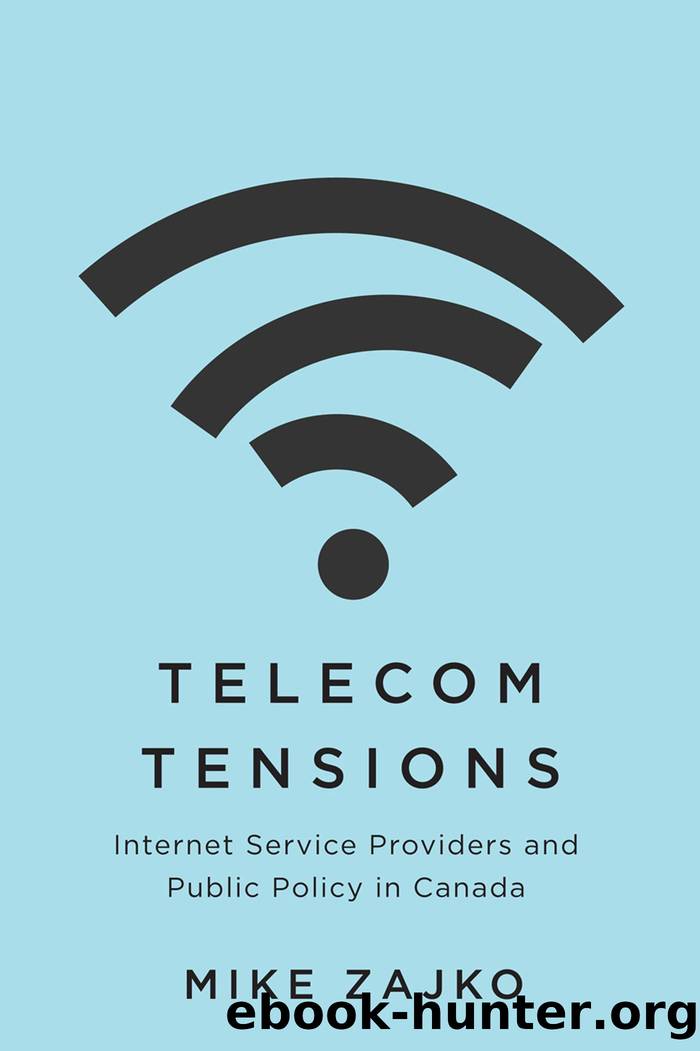Telecom Tensions: Internet Service Providers and Public Policy in Canada by Mike Zajko

Author:Mike Zajko
Language: eng
Format: epub
Publisher: McGill-Queen’s University Press
Published: 2021-05-15T00:00:00+00:00
Net Neutrality and Price Discrimination
Net neutrality can be enforced to minimize the extent to which ISPS actively intervene in traffic flows, but the CRTCâS (2009) ITMP frame work recognized that traffic management does not have to involve directly acting upon data packets. A city can manage traffic congestion by blocking certain types of vehicles from using a roadway, or it can make driving more expensive, using economic incentives and disincentives. Similarly, an isp can use DPI to detect and throttle certain kinds of packets, or it can impose different prices on a subscriber for different uses of the internet. Canadaâs common carriage regulations developed around concerns over price discrimination for news services, and an isp might similarly play favourites through its billing practices.
At the time of the initial ITMP framework, economic ITMPS were seen as less problematic than technical ones. Particularly for managing congestion on wireless networks with scarce bandwidth, the CRTC preferred that isps impose greater costs on subscribers who used more data, rather than using technical controls over their data flows. This gave subscribers greater choice and put âmarket forces to workâ in governing behaviour (CRTC 2009, para. 40). Until their suspension during the COVID-19 pandemic, these âdata capsâ for phone subscribers continued to be common practice in Canada, charging subscribers more when they exceeded a certain amount of usage. The CRTCâS acceptance of these practices was based on the fact that they treated all data the same. However, just as an isp can discriminate between packets, subjecting some kinds of traffic to throttling but not others, it is possible to make some packets count towards a subscriberâs data cap (potentially resulting in overage fees) while privileging a different kind of traffic by making it exempt from data caps. This practice, known as âzero-rating,â compelled a regulatory novice to take on some of Canadaâs largest companies, and win.
At the time that he submitted his formal complaint to the CRTC, Ben Klass was a graduate student at the University of Manitoba, with a deep interest in telecom policy. In the summer of 2013 Klass had been in contact with Jean-François Mezei, who had recently blazed a trail as an independent expert on CRTC disputes. Mezei had attended the 2008 net neutrality protest on Parliament Hill, and ever since had actively participated in CRTC proceedings, making a significant contribution to the UBB issue discussed in chapter 4 (Chase and Marlow 2011), and helping Teresa Murphy with her gaming complaints (resa1983 2011). By 2013, Mezei had developed an understanding of CRTC procedures at a level normally possessed by regulatory lawyers, and when Klass explained his concern over differential pricing being a violation of anti-discrimination rules and the ITMP framework, Mezei encouraged him to formulate his complaint as a âPart 1 applicationâ to the Commission. Klass, in contact with Mezei, developed his draft application over several months and submitted it in November 2013 (Klass 2015).
The precipitating event had been Bellâs announcement earlier in the year that it would be offering a mobile
Download
This site does not store any files on its server. We only index and link to content provided by other sites. Please contact the content providers to delete copyright contents if any and email us, we'll remove relevant links or contents immediately.
| Automotive | Engineering |
| Transportation |
Whiskies Galore by Ian Buxton(42014)
Introduction to Aircraft Design (Cambridge Aerospace Series) by John P. Fielding(33128)
Small Unmanned Fixed-wing Aircraft Design by Andrew J. Keane Andras Sobester James P. Scanlan & András Sóbester & James P. Scanlan(32800)
Craft Beer for the Homebrewer by Michael Agnew(18245)
Turbulence by E. J. Noyes(8047)
The Complete Stick Figure Physics Tutorials by Allen Sarah(7372)
The Thirst by Nesbo Jo(6944)
Kaplan MCAT General Chemistry Review by Kaplan(6933)
Bad Blood by John Carreyrou(6621)
Modelling of Convective Heat and Mass Transfer in Rotating Flows by Igor V. Shevchuk(6440)
Learning SQL by Alan Beaulieu(6289)
Weapons of Math Destruction by Cathy O'Neil(6279)
Man-made Catastrophes and Risk Information Concealment by Dmitry Chernov & Didier Sornette(6019)
Digital Minimalism by Cal Newport;(5764)
Life 3.0: Being Human in the Age of Artificial Intelligence by Tegmark Max(5558)
iGen by Jean M. Twenge(5415)
Secrets of Antigravity Propulsion: Tesla, UFOs, and Classified Aerospace Technology by Ph.D. Paul A. Laviolette(5371)
Design of Trajectory Optimization Approach for Space Maneuver Vehicle Skip Entry Problems by Runqi Chai & Al Savvaris & Antonios Tsourdos & Senchun Chai(5068)
Pale Blue Dot by Carl Sagan(5007)
